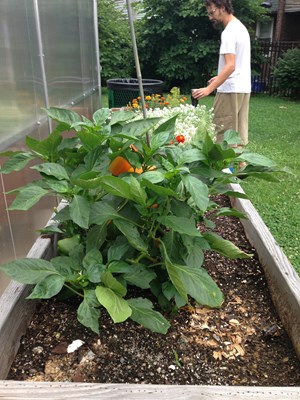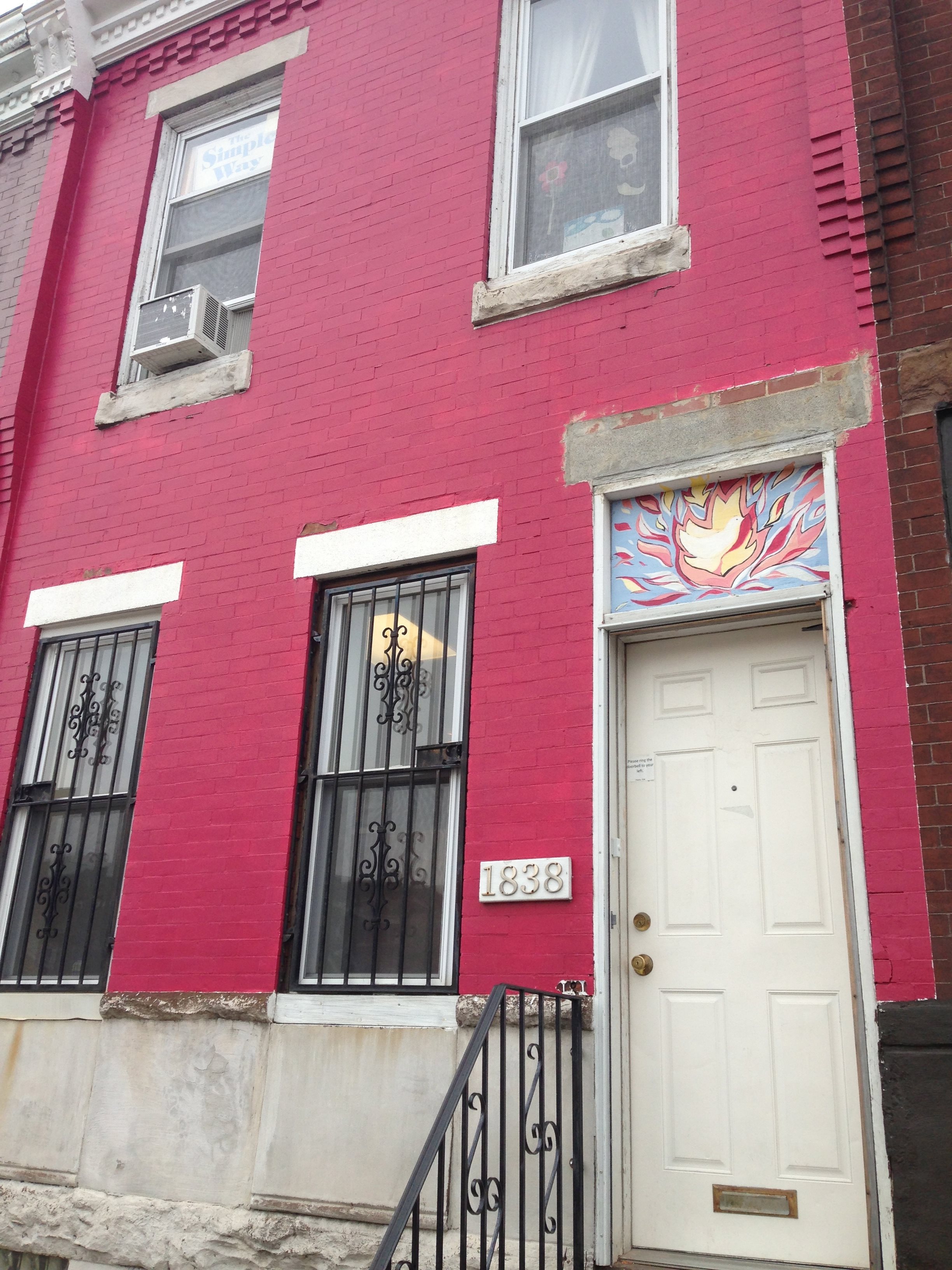Shane Claiborne on Sustainable Living
Shane Claiborne greeted me at the door of The Simple Way, the urban faith community he and his wife Katie are part of in North Philadelphia. Emerging from a bright pink housefront on a street littered with empty pop cans, bags of chips, and plastic bottles, Shane and I walked five blocks from the organization's headquarters on Allegheny to his private row home on Potter Street. Having worked alongside Mother Teresa in Calcutta, spent time as a part of peace committees in Iraq and Afghanistan, and been arrested for "disorderly conduct" for sleeping on benches with the homeless in a park, Shane told me about this new season of life in which he's growing grapevines, raising pet rabbits, and changing the world.
"It's okay to be scared—the world is a pretty scary place," Shane told me. "But love drives away fear so we can live with the courage that comes from our faith and from our community. When we live with courageous people, it makes us more courageous, and when we live with timid people, it makes us more timid."
As we walked around the Potter Street Triangle, a neighborhood where drug use and crime are daily realities, I took in the sights, smells, and impressions of the inner city—tiny yards, narrow streets, minimal space between buildings. The Simple Way has planted community gardens and a greenhouse in between abandoned houses it's renovating and turning over to become affordable housing units on the block. These gardens are symbols of hope in an urban landscape.
A "Garden of Eden" is sprouting in the middle of North Philadelphia.

Shane and his wife Katie foster intentional communities and green living as part of The Simple Way community in North Philadelphia. In addition to overseeing and managing two public parks, a community garden, thriving after-school tutoring programs, a gardening project, flag football league, and a food bank, the Claibornes make intentional choices to live sustainably with community gardens, a worm farm, and a recently constructed greenhouse that runs on aquaponics.
How do you live sustainably in this small urban area?
In everything we do, we are mindful of how things are interconnected in the cycle of life. So we have rabbits here with immediately compostable poop we can throw in the garden, then we have worms in our basement that create a lot of our dirt. It almost looks like a beehive, but it's a worm hive. We've got two different breeds of worms, and they help fertilize the garden.
We have a grapevine, herbs, tomatoes, and cantaloupe. Our newest project is a greenhouse. Our aquaponic system is about as cutting edge as we get. It's a symbiotic, integrated system of life where the fish are below the greenhouse, and plant life is above. We built it on top of the basement of a house that burned down in the fire. There are approximately 1,000 tilapia in the fish tank below, and their waste becomes food for the plants. The greenhouse and symbiotic pump run by solar power, and the plants don't have any soil—they're living in rocks off the nutrients from the fish.
The plants' rock beds fill up for 45 minutes. That creates suction, and the water eventually gets sucked back down. Then it fills up and it all happens again. We're growing peppers, okra, blackberry bushes, thyme, beets, Swiss chard, and carrots. People have been doing this for hundreds of years, but in the concrete jungle of Philly, it's unique.
How do you get the community involved in all of this?
This aquaponics system and greenhouse may look intimidating, but we really just got some neighbors together to dig this out. It's a testament that many hands make light work. We also pooled resources to get the greenhouse materials. We've also got a neighborhood association so we all make decisions together on how we do stuff. It's cool because a lot of this stuff you can do anywhere. If you can plant a garden here, you can do it anywhere. Our gardens are community gardens, so we're all doing this together. Our squash is growing, and we also have strawberries, asparagus, morning glories, squash, and cucumber.
What's the connection between faith, food, and community?
A good place to start is seeing what a central place food has all through Scripture. One of the first things Jesus does after the resurrection is cook fish for his friends on the shore, and Jesus' first miracle was turning water into wine to keep the party going. That places food and fellowship at the center of our faith. There are also challenges to how we eat and who we eat with. One of the most radical things Jesus did was eat with the wrong people: He had a Pharisee, a tax collector, a religious person, political misfits, and social outcasts together. Everyone is invited to be a new creation and join this new community Christ has formed.
The Eucharist, or communion, is one of the most mystical expressions of that. When I worked with Mother Teresa in India, we used to have communion every morning. When I asked one of the nuns why we did it every morning, she said, "You've heard the saying, we are what we eat? That's what we're remembering—that we're digesting the body of Christ, that Christ would live in us."
There's an economics of what we eat as well. When Jesus teaches the disciples to pray, he says, "Give us this day our daily bread." It's a really simple prayer—that we'd have enough for today. If we're trying to love our neighbors as ourselves, the phrase "give us this day our daily bread" is a radical critique of today's consumer culture, where the average North American is consuming the same amount as 500 people in Africa. That prayer comes with responsibility. It comes with opening up our table, and always having a seat for the stranger. I love Proverbs 30:8– 9 that says, 'give me neither poverty nor riches, for in my poverty I might be forced to steal, or in my riches I might forget my God.' There's enough for everyone's need, but there's not enough for everyone's greed. We need to live more simply so others can live at all.
Why is it important for us to be good stewards of creation?
As we connect to creation, we connect to the Creator, and there's something spiritual about connecting with where life comes from. When we grow disconnected and commodify life, or don't have any sense of how things connect with each other, that allows us to do pretty terrible things like drones, wars, pollution, oil spills, and all that stuff. In the end we're pretty simple in how we think about it. It brings us life. We don't do it because we have to or because we feel guilty about drinking out of a Styrofoam cup—we do it because it's an amazing thing to wake up and go get dirt under our fingernails. One of our neighbors said it kind of feels like we're planting the Garden of Eden in our neighborhood. I'd say that's a pretty good theology of what we're trying to do.
Shane Claiborne is an author, speaker, and founding partner of The Simple Way. Allison J. Althoff is online editor for Today's Christian Woman. You can follow her at @ajalthoff.
Subscribe to TCW's free e-newsletter at this link for weekly updates and opportunities to win free books and music
Read more articles that highlight writing by Christian women at ChristianityToday.com/Women
 Read These Next
Read These Next

 Is 'Christian' Grocery Shopping Even a Thing?It might be.
Is 'Christian' Grocery Shopping Even a Thing?It might be.

 Leading When You’re Not in ChargeYou can’t lead if you don’t know how to follow.
Leading When You’re Not in ChargeYou can’t lead if you don’t know how to follow.








 Homepage
Homepage



